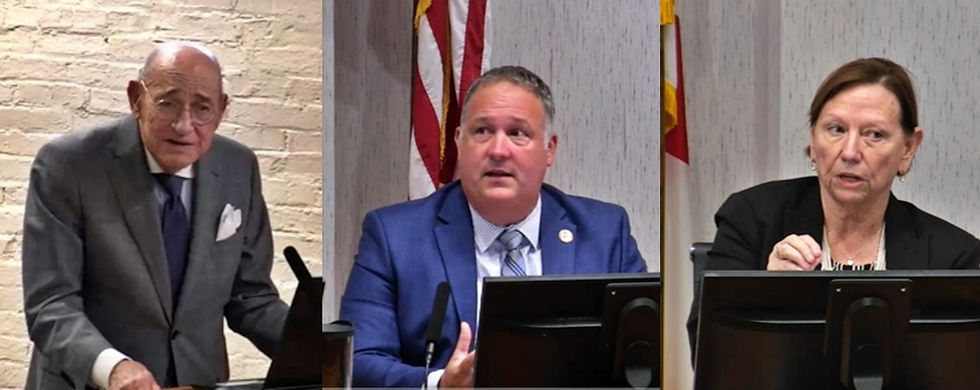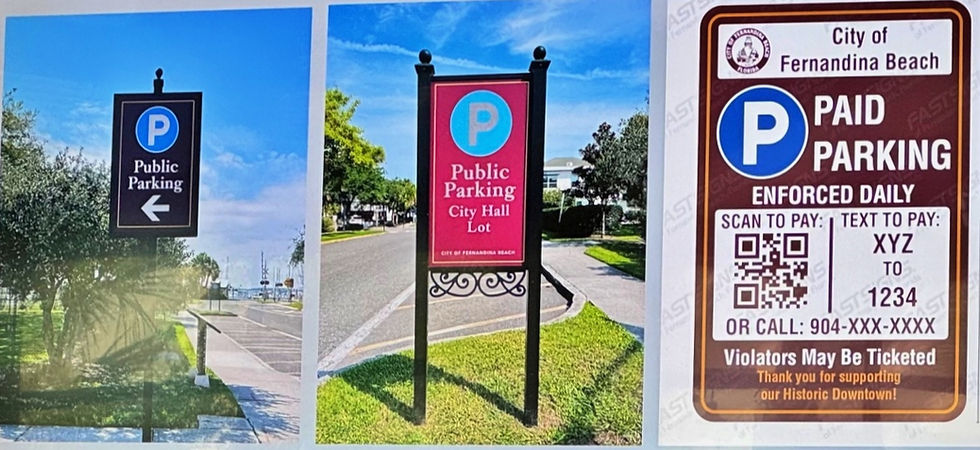Focus on Bioethanol tops City's 2026 state legislative concerns
- Mike Lednovich
- Sep 19, 2025
- 4 min read

Political maneuvering by the Florida legislature to change the definition of bioethanol processing was the top priority for the Fernandina Beach City Commission by a 4-1 vote Tuesday.
Rayonier Advanced Materials (RYAM) efforts to construct a $53 million bioethanol plant despite not being allowed by the city's Land Development Code saw efforts by both the state house and senate with proposed bills this past year. Those efforts were to change the definition of the ethanol process from chemical manufacturing - which is prohibited by the LDC - to fermentation, considered a natural process. Both of those efforts failed after legislators were flooded with calls from concerned Amelia Island residents.
The city anticipates a similar strategy will be employed in the legislature in 2026. "We would like Buddy (Jacobs) to directly lobby that bioethanol language (so it) does not sneak back into some bill," said Commissioner Tim Poynter.
The commission also identified three other issues as priorities, which included:
Fighting proposals to eliminate state property taxes, which could strip cities of critical funding.
Pushing back against limits on extraterritorial surcharges and enterprise fund transfers, key tools Fernandina uses to fund its utilities.
Challenging the blanket application of the Live Local Act, especially on barrier islands like Amelia Island, where higher density development poses unique risks.
The vote came after a sharp debate between Vice Mayor Darron Ayscue and Commissioner Genece Minshew. Ayscue, who also serves as chair of the local Republican Party, pushed to keep the city’s lobbying focused strictly on appropriations, steering clear of battles with Tallahassee’s GOP-led agenda.
“I'm not big in getting involved in the state's policy,” Ayscue said. “I'm a budget guy.”
He pointed to recent wins: “In this past year, focusing solely on appropriations, we were able to get $4 million… Fernandina has led the way almost from Senate District 4 and House District 15 in our appropriations.” Ayscue warned that pushing too many policy issues would dilute their message: “If the message gets sprawled out to five or six or seven items, you're going to lose focus on those appropriations.”
However, Minshew quickly dismissed Ayscue's political rhetoric saying the commissioners' jobs were to defend the city from overreaching ambitions of the state to undermine home rule.
Minshew led the call for a broader strategy.
“While we stand there with our hand out asking for money in one hand, the other hand is being tied behind our back,” she said. “If all we do is ask for money, at some point there's not going to be anything else we're allowed to do.”
Minshew cautioned that a growing number of state bills were undermining city governments' ability to manage growth and infrastructure. She specifically called out threats to Fernandina’s 25% wastewater surcharge for non-residents.
“If we lose the ability to do that surcharge, then we have reduced the ability to manage and maintain our wastewater system,” she said. “We cannot recover it someplace else, except by raising taxes or raising utility rates — which none of us want to do.”
Minshew requested financial data on the surcharge’s revenue impact, directing staff to arm the city’s lobbyist with solid numbers.
“I want to know how much money that's bringing in, what are we doing with it, and give that information to Mr. Jacobs so that when he is in Tallahassee and this issue comes up, he can actually say, that is an impact to my city of this much money.”
Ayscue also maintained that lobbyist Buddy Jacobs only gets a few minutes with state lawmakers: “You have five minutes max. Some of that’s even just eaten up with hello.”
But longtime resident Julie Ferriera took to the podium to challenge that claim.
“I went to the state legislature, and I sat down with both (Representative Dean) Black and (Senator Clay) Yarbrough,” Ferriera said. “One I got 45 minutes with, and one I got 30 minutes with. So, I don't think that we can say that Buddy only is going to get five minutes with somebody.”
Ferriera urged the commission to give Jacobs the flexibility he needs: “Buddy is our lifeline. He has contacts, left, right, middle. He has long-term friendships. I think that he needs full leniency to respond. Things pop up in the legislature all the time.”
She also supported the city taking a stronger stand on home rule. “Home rule is being sliced and diced, and this city needs to push back,” she said.
Minshew made a final point about the lobbyist's role with the city.
"We are not asking him (Buddy Jacobs) to stand out on the street corner with a sign, marching up and down and managing protests. We are just asking him to understand these issues are important to us," she said.
Four of the commissioners were united on at least one front: opposition to any proposed bioethanol bills.
Poynter also raised concerns about the Live Local Act, which overrides local zoning to promote affordable housing. He urged an exemption for Florida’s barrier islands: “Having more people just jam into every type of piece of property that's left on this island makes absolutely no sense to me.”
Lobbyist Jacobs, who has represented Fernandina Beach for over two decades, told commissioners he’ll do whatever they direct. “I'm just in sales. Y’all are in management,” he said. “Whatever you want me to do, I'll do.”
Jacobs encouraged the city to send a unified message to Tallahassee and praised the impact of their in-person visits last year. “Whenever y’all came to Tallahassee last year, you had impact,” he said. “Your presence… was very influential.”
The commission voted 4–1 to adopt the top four priorities. Ayscue cast the sole dissenting vote, citing his opposition to wading into state policy battles.
All other issues on the city’s legislative list — including Senate Bill 180, that if passed, it sets precedent for more state-level overrides on local zoning, land use, and environmental planning — were referred to the Florida League of Cities for broader advocacy.
As Jacobs assured the commission: “SB 180 will be hard fought at the state level… there are lawsuits, and we’re approved to work with the League of Cities on that one.”




Ayscue really doesn't give a darn about the City of Fernandina Beach. He's just using the commissioner position as a stepping stone to state office. He can't be trusted!